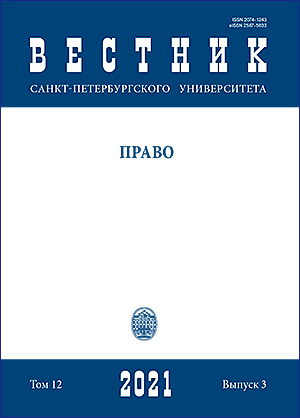Features of informatization of the criminal process in the context of the pandemic: New challenges
DOI:
https://doi.org/10.21638/spbu14.2021.304Abstract
The article analyses the features of the application of the current criminal procedural legislation in practice in the context of the new coronavirus infection (COVID-19) after recognizing it as a disease that poses a danger to others, the Decree of the Presidium of the Supreme Court of the Russian Federation of April 08, 2020 and Reviews on certain issues of judicial practice related to the application of legislation and measures to counter the spread of the new coronavirus infection in the Russian Federation of April 21, 2020 and April 30, 2020. However, the difficulties that have arisen in law enforcement practice, also assessed in the article, indicate that criminal procedural legislation will be adjusted in the near future since the number of Decisions of the Presidium and the Plenum of the Supreme Court of the Russian Federation are not sufficient to eliminate ambiguities and contradictions in the Code of Criminal Procedure of the Russian Federation. In particular, the article reflects such key problems as the emerging system of procedural decisions at the pre-trial and trial stages in a pandemic, the possibility of considering not only criminal cases but also case materials using videoconferencing systems as well as the prevailing and optimal understanding by law enforcement agencies of the category “urgency” of such consideration. The authors pay special attention to the absence in the Code of Criminal Procedure of the Russian Federation of the concepts introduced by paragraph “m” Art. 7 of the Constitution of the Russian Federation such as “information technologies” and “digital data turnover”. The results of the study make it possible to formulate proposals for improving criminal procedural regulation in terms of the described problems.
Keywords:
criminal proceedings, criminal procedural legislation, criminalistics, information technology, COVID-19, pandemic
Downloads
References
Downloads
Published
How to Cite
Issue
Section
License
Articles of "Vestnik of Saint Petersburg University. Law" are open access distributed under the terms of the License Agreement with Saint Petersburg State University, which permits to the authors unrestricted distribution and self-archiving free of charge.






